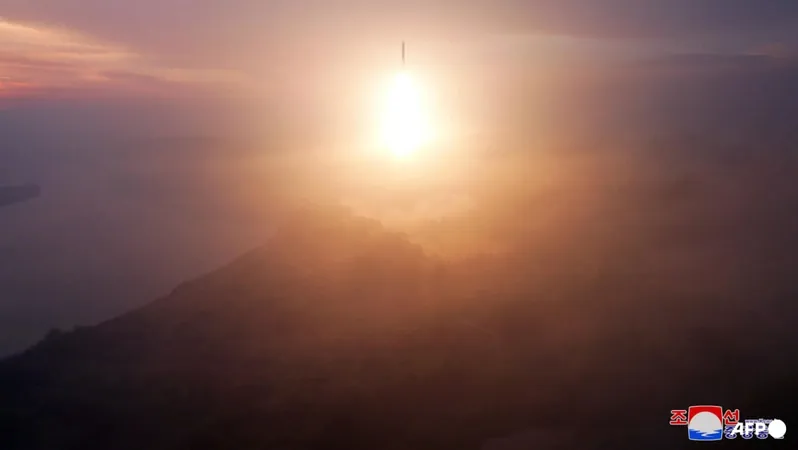
North Korea Tests Powerful ICBM Amid Rising Tensions Over Troop Deployment to Russia
2024-10-31
Author: Li
SEOUL: In a provocative move, North Korea has announced a successful test launch of one of its latest and most advanced intercontinental ballistic missiles (ICBMs) on Thursday, October 31.
This marks the regime's first weapons test since it faced accusations of deploying troops to support Russia's military efforts.
Just prior to the launch, South Korean defense officials had indicated that North Korea was poised to conduct additional missile tests or possibly a nuclear test, particularly in the context of the upcoming United States elections.
The missile was reportedly fired shortly after a joint statement from U.S. Secretary of Defense Lloyd Austin and his South Korean counterpart, who condemned North Korea's troop presence in Russia.
They voiced concerns that North Korean soldiers, clad in Russian military uniforms, may be assigned to engage in military operations in Ukraine.
Preliminary assessments by South Korea's military suggest that the missile tested was a new solid-fueled long-range ballistic missile, with an impressive range of approximately 1,000 kilometers.
The missile traveled on a lofted trajectory, which means it was launched into an elevated path rather than directly towards a target.
North Korea characterized the missile launch as a significant military action, emphasizing its commitment to strengthening its nuclear capabilities.
The state news agency reported that Kim Jong Un stated the test 'updated the recent records of our strategic missile capability,' proclaiming that his nation would not waver in its efforts to bolster its nuclear arsenal.
The missile flew for approximately 86 minutes, reaching altitudes of 7,000 kilometers, making it one of the highest-flying missiles ever tested by North Korea, according to Japanese officials.
In a swift response, the U.S. condemned the launch as a blatant violation of several United Nations Security Council resolutions.
National Security Council spokesman Sean Savett expressed the administration's concern about North Korea's increasing missile capabilities.
Meanwhile, China has expressed its concern regarding the escalating tensions on the Korean peninsula and has urged for a peaceful resolution to the crisis.
In retaliation to North Korea's aggressive stance, South Korea, the U.S., and Japan plan to conduct joint military drills that will involve U.S. strategic assets.
Furthermore, South Korean President Yook Suk Yeol announced intentions to impose new independent sanctions on North Korea and collaborate with the United Nations to address what he termed Pyongyang's 'habitual violations' of international law.
Experts speculate that North Korea's latest missile test may serve as a distraction from international scrutiny regarding its military collaboration with Russia.
Yang Moo-jin, president of the University of North Korean Studies in Seoul, noted that the missile launch could be a diversion from the criticism surrounding North Korea's troop deployments.
Concerns have been raised that the deployments of North Korean soldiers to Russia might signal a significant security threat, with allegations that the North is receiving military supplies in return for its support.
Reports suggest that Russia may be providing advanced missile technology to North Korea, further heightening international alarm about the evolving military collaboration.
While North Korea officially denies sending troops to assist Russia, state media recently commented that if any troop deployments were to occur, they would adhere to international law,
embellishing the complex diplomatic landscape surrounding these developments.
As global scrutiny intensifies and alliances are tested, the world watches closely as North Korea continues to develop its missile capabilities and assert its military presence,
with potential implications for regional and global security dynamics.

 Brasil (PT)
Brasil (PT)
 Canada (EN)
Canada (EN)
 Chile (ES)
Chile (ES)
 España (ES)
España (ES)
 France (FR)
France (FR)
 Hong Kong (EN)
Hong Kong (EN)
 Italia (IT)
Italia (IT)
 日本 (JA)
日本 (JA)
 Magyarország (HU)
Magyarország (HU)
 Norge (NO)
Norge (NO)
 Polska (PL)
Polska (PL)
 Schweiz (DE)
Schweiz (DE)
 Singapore (EN)
Singapore (EN)
 Sverige (SV)
Sverige (SV)
 Suomi (FI)
Suomi (FI)
 Türkiye (TR)
Türkiye (TR)